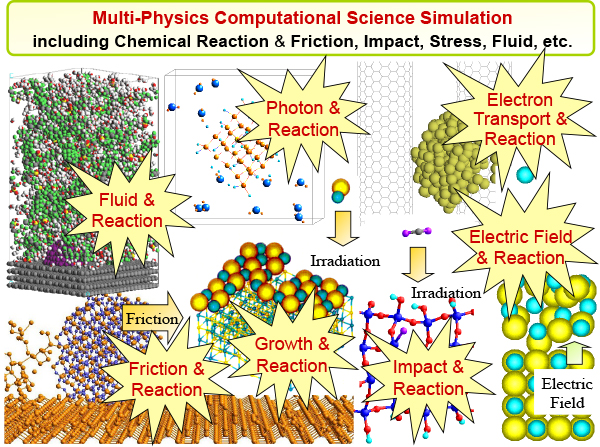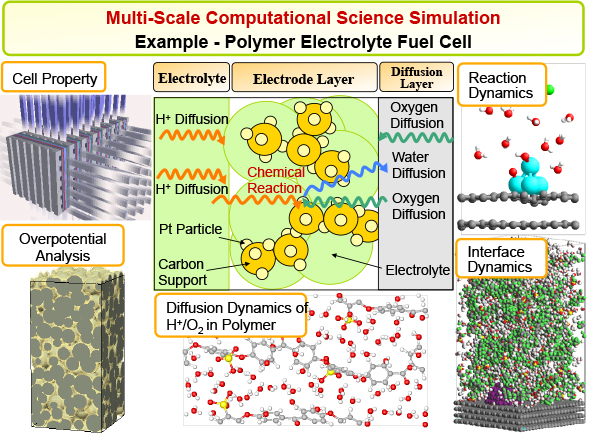For Prospective Students of Kubo Laboratory
Kubo Laboratory welcomes highly qualified Ph. D and Ms. Students who are interested in the high-level and high-accuracy system, process, and material design by the state-of-the-art simulation from all over the world. Especially, Kubo laboratory accepts a wide variety of students who are graduated from any department, any faculty, any university, and any country. Surely we also accept the students who majored in a variety of research fields such as mechanical engineering, material, chemistry, physics, electronics, metal, energy, information science, mathematic, aerospace, nuclear, and others during the undergraduate program of the university. We provide the laboratory tours and consultation for prospective students at any time. Please feel free to contact with Prof. Kubo.
Would you achieve the breakthrough and innovation of the system, process, and material design for energy, environment, and nano-technology by the state-of-the-art computational simulation and quantum chemistry with us?
Professor Momoji Kubo
Division for Materials Design by Computer Simulation
Institute for Materials Research, Tohoku University
2-1-1 Katahira, Aoba-ku, Sendai 980-8577, Japan
(Professor Room) TEL: +81-22-215-2050 FAX: +81-22-215-2051
(Laboratory) TEL: +81-22-215-2052
E-mail for prospective students

Merits of Students to Study and Make Research in Kubo Laboratory
- Kubo laboratory studies a wide variety of systems and materials such as fuel cell, solar cell, tribology, micromachine, clean energy, electric car, aerospace instrument, power plant, hydrogen station, electronics etc. and then the students in Kubo laboratory naturally can obtain a wide variety of knowledge and sophistication.
- Kubo laboratory develops a wide variety of computational simulation methodologies from electronic-/atomic-scale to macro-scale, and then the students in Kubo laboratory can obtain the ability to study and make research from the sight of electronic-/atomic-scale to the sight of macro-scale.
- Kubo laboratory develops the state-of-the-art simulation methodologies and then the students in Kubo laboratory can discuss and interact with the leading researchers in the world and can obtain the ability to produce a lot of new ideas and technologies for the leading-edge research and development by themselves.

Official Admission Information
Official information for the admission to the Master's and Doctoral Programs in the Graduate School of Engineering, Tohoku University, Japan is shown in the following web site. Graduate students of Kubo laboratory belong to the Department of Materials Science, Graduate School of Engineering, and then please refer to the the admission information of the Department of Materials Science.
Admission Information Web Site: http://www.eng.tohoku.ac.jp/english/admission/
Research Strategy and Theme in Kubo Laboratory
Pioneering Multi-Physics and Multi-Scale Computational Science Simulation
In order to solve the energy and environmental problems, to realize the safe and secure society, and to create new industry and market in the world, the development of the super-precise and super-miniaturized system and the high-functional and high-performance materials is strongly required in a variety of research fields such as fuel cell, solar cell, clean energy, micromachine, tribology, electric car, aerospace instrument, power plant, hydrogen station, electronics, etc.
Especially, the recent system, process, and material technologies constitute of multi-physics phenomena including chemical reaction, friction, impact, stress, fluid, photon, electron, heat, electric and magnetic fields etc. and then the chemical reaction, structure, fluid, and others on atomic-scale strongly influences the system performance and property on macro-scale. However, the traditional simulation methods in the mechanical engineering fields such as fluid mechanics, finite element, finite volume, and other methods cannot clarify the multi-physics phenomena including the chemical reactions on electronic- and atomic-scale.
Therefore, Kubo laboratory is developing new multi-physics and multi-scale computational simulation technology based on first-principles molecular dynamics for pioneering next-generation system, process, and material design and development in the mechanical engineering fields.
Furthermore, Kubo laboratory applies the above originally developed simulation technology to a wide variety of research themes as follows and aims to realize the high-level and high-accuracy system, process, and material design.
- Tribology Simulation for Aerospace and Automotive Systems
- Fuel Cell Simulation, Hydrogen Production and Storage Simulation
- Micromachine and MEMS Simulation
- Solar Cell and Secondary Battery Simulation
- Silicon and Diamond Semiconductor Device Simulation
- Plasma Display and Flexible Display Simulation
- Oxide Electronics, Light and Laser Emitting Diode Simulation
- Ultraprecision Machining, Processing, and Fabrication Process Simulation
- Stress Corrosion Cracking and Hydrogen Assisted Cracking Simulation for Power Plant
- Photocatalysis and Environmental Catalysis Simulation
Moreover, Kubo laboratory expands the above simulation outcomes to solving the energy and environmental problems, to realizing the safe and secure society, and to creating new industry and market.
